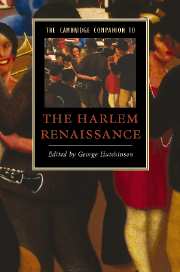Book contents
- Frontmatter
- Introduction
- Part I: Foundations of The Harlem Renaissance
- Part II: Major Authors and Texts
- 4 Negro drama and the Harlem Renaissance
- 5 Jean Toomer and the avant-garde
- 6 “To tell the truth about us”: the fictions and non-fictions of Jessie Fauset and Walter White
- 7 African American folk roots and Harlem Renaissance poetry
- 8 Lyric stars: Countee Cullen and Langston Hughes
- 9 “Perhaps Buddha is a woman”: women’s poetry in the Harlem Renaissance
- 10 Transgressive sexuality and the literature of the Harlem Renaissance
- 11 Sexual desire, modernity, and modernism in the fiction of Nella Larsen and Rudolph Fisher
- 12 Banjo meets the Dark Princess: Claude McKay, W. E. B. Du Bois, and the transnational novel of the Harlem Renaissance
- 13 The Caribbean voices of Claude McKay and Eric Walrond
- 14 George Schuyler and Wallace Thurman: two satirists of the Harlem Renaissance
- 15 Zora Neale Hurston, folk performance, and the “Margarine Negro”
- Part III: The Post-Renaissance
- Further Reading
- Index
12 - Banjo meets the Dark Princess: Claude McKay, W. E. B. Du Bois, and the transnational novel of the Harlem Renaissance
from Part II: - Major Authors and Texts
Published online by Cambridge University Press: 28 July 2007
- Frontmatter
- Introduction
- Part I: Foundations of The Harlem Renaissance
- Part II: Major Authors and Texts
- 4 Negro drama and the Harlem Renaissance
- 5 Jean Toomer and the avant-garde
- 6 “To tell the truth about us”: the fictions and non-fictions of Jessie Fauset and Walter White
- 7 African American folk roots and Harlem Renaissance poetry
- 8 Lyric stars: Countee Cullen and Langston Hughes
- 9 “Perhaps Buddha is a woman”: women’s poetry in the Harlem Renaissance
- 10 Transgressive sexuality and the literature of the Harlem Renaissance
- 11 Sexual desire, modernity, and modernism in the fiction of Nella Larsen and Rudolph Fisher
- 12 Banjo meets the Dark Princess: Claude McKay, W. E. B. Du Bois, and the transnational novel of the Harlem Renaissance
- 13 The Caribbean voices of Claude McKay and Eric Walrond
- 14 George Schuyler and Wallace Thurman: two satirists of the Harlem Renaissance
- 15 Zora Neale Hurston, folk performance, and the “Margarine Negro”
- Part III: The Post-Renaissance
- Further Reading
- Index
Summary
The most notorious bad review of the Harlem Renaissance peaks with an upset stomach and an itch for soap. In an installment of his regular “Browsing Reader” column in The Crisis, W. E. B. Du Bois accused Claude McKay's Home to Harlem (1928) of being nasty, brutish, too long, and largely unhygienic. “[F]or the most part,” Du Bois confessed, McKay's bestselling novel “nauseates me, and after the dirtiest parts of its filth I feel distinctly like taking a bath.” Several features of Home to Harlem inspired this unusually embodied instance of reader response criticism. The novel fed the lechery of debased white bohemians, charged Du Bois, a smart set eager to project its own fantasies of “utter licentiousness” onto “black Harlem,” and powerful enough within the New York publishing industry to do so in wide public view. McKay satisfied this small but influential constituency for transracial pornography with rare skill, Du Bois allowed, summoning “every art and emphasis to paint drunkenness, fighting, lascivious sexual promiscuity and utter absence of restraint in as bold and as bright colors as he can.” Yet gilding the lily of decadence did not make for lean, harmoniously integrated fiction. Home to Harlem was “padded,” deprived of a logical plot or “any artistic unity.” It cried out for a well-wrought, well-scrubbed sequel free from a “dirty subject” and supplied with a “strong, well-knit as well as beautiful theme.” Before any such sequel was forthcoming, Du Bois' review inspired a blistering private letter from McKay. Questioning the elder statesman's basic credentials as a critic and author of mimetic fiction, McKay mockingly pitied Du Bois' removal from “real life” forced by his role as a racial advocate.
- Type
- Chapter
- Information
- The Cambridge Companion to the Harlem Renaissance , pp. 170 - 183Publisher: Cambridge University PressPrint publication year: 2007
- 1
- Cited by

